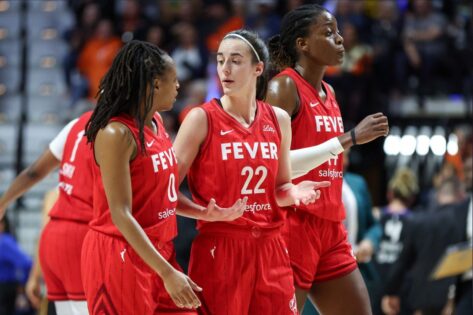

Caitlin Clark's arrival in the WNBA has been nothing short of a cultural phenomenon, bringing unprecedented attention and viewership to the league. However, this increased spotlight has also ignited several controversies, some of which have inadvertently involved her Indiana Fever teammates. A recent incident, as reported by a national reporter, has landed one of Clark's teammates in hot water, highlighting the complexities and pressures surrounding the young star and her team.
The specific details of the "truth bomb" and the teammate's "bold stance" remain somewhat vague, but it is clear that the situation has sparked considerable debate and discussion within the WNBA community and beyond. The increased attention on Clark and the Fever has led to heightened scrutiny of every action and statement made by players and coaches alike. This creates a challenging environment where even seemingly innocuous comments can be blown out of proportion and lead to significant repercussions.
One notable instance of controversy surrounding Clark involves a game between the Indiana Fever and the Chicago Sky, during which Sky guard Chennedy Carter committed a hard foul against Clark. The foul, which occurred away from the ball, resulted in Clark falling to the ground and was later upgraded to a flagrant-1 violation by the WNBA. While Clark downplayed the incident, stating that she expected to take "a couple of hard shots a game," Fever coach Christie Sides took to social media to demand action from the WNBA, calling the officiating "unacceptable".
The incident sparked widespread debate about whether Clark was being unfairly targeted and whether the league was doing enough to protect her. Some observers argued that the physicality was simply part of the game, while others claimed that Clark was being singled out due to her race, popularity, and the perceived threat she posed to established WNBA stars. This controversy further intensified existing tensions within the league and fueled the narrative of a divide between those who welcomed Clark's arrival and those who felt threatened by it.
Adding to the complexity, a columnist, Gregg Doyel, who had previously been suspended for inappropriate comments made to Clark, returned to covering the Fever, sparking outrage among fans who felt he should have been permanently banned. This situation highlights the challenges the WNBA faces in navigating the increased media attention while also addressing issues of sexism and respect within its own ranks.
Despite the controversies, Clark has consistently attempted to maintain a positive attitude and focus on her play. She has publicly praised her fellow players, including rivals like Angel Reese and A'ja Wilson, and has repeatedly stated her desire to contribute to the growth of the WNBA. However, some argue that it is unfair to place the burden of addressing social media controversies and fan behavior on Clark, especially as a rookie.
The situation surrounding Caitlin Clark and the Indiana Fever underscores the complex dynamics at play in the WNBA today. While Clark's arrival has undoubtedly brought positive changes, it has also exposed existing tensions and created new challenges for the league and its players. As the WNBA continues to grow and evolve, it will be crucial to address these issues head-on and create a more inclusive and equitable environment for all.